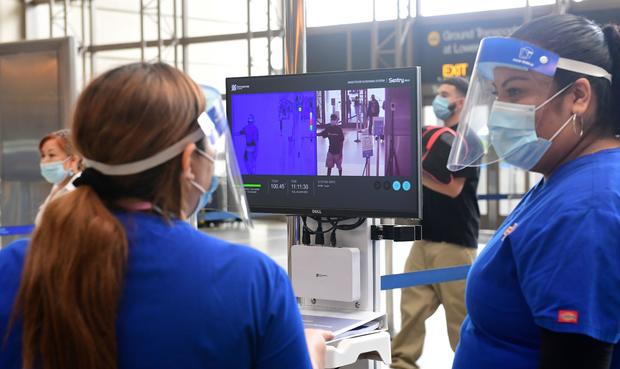The CDC warns that any "travel increases your chances of getting and spreading COVID-19."
Henry Harteveldt, a travel industry analyst at the Atmosphere Research Group, says flying is a safe option for travelers, "but it is not a risk-free option."
According to Harteveldt, airports have taken steps to protect travelers like cleaning with greater frequency, installing plexiglass shields at check-in counters and hand sanitizing stations throughout the building.
But unlike airports, which tend to follow local regulations, safety precautions vary once you're on a plane, he said. Some airlines have temporarily stopped filling middle seats to increase distance between passengers. Passengers must wear masks on flights, and some food and beverage service is being curtailed.
But American Airlines recently announced that it will begin booking flights to capacity on July 1 instead of leaving vacant seats for social distancing.
CDC Director Dr. Robert Redfield told a Senate committee hearing there was "substantial disappointment" with American Airlines' decision to fill planes. "We don't think it's the right message," he said, adding that it is under "critical review" by the CDC.
Harteveldt urged travelers to familiarize themselves with an airline's COVID-19 precautions before booking a flight. He recommends passengers pack:
-
Multiple face coverings, especially for long flights, as they may not be provided to you.
-
Hand sanitizer for every person traveling with you. TSA is now allowing passengers to bring 12 oz. hand sanitizers, as opposed to the previous 3 oz.
-
Disposable gloves and sanitizing wipes. Even if the airline is cleaning planes between flights, wiping down your seat, tray table, and window shade can eliminate germs.
-
Your own food. Most airlines are not selling food on domestic flights, and many airport restaurants are closed.
Before you get to the airport, Harteveldt said travelers should also download their airline's app and check in ahead of time to reduce contact with other people. And, to further avoid passing germs, hold onto your phone when TSA scans your boarding pass.
If you can avoid checking your bag, do so, he said. And whether or not you've checked a bag, wipe it down before you leave the airport.
"You can't be too careful," he said.
The CDC recommends that before getting on a plane, travelers first scrutinize their destination. If COVID-19 is spreading where you are going — which you can determine on the CDC's COVID tracker map — the agency warns travelers that they could become infected while away from home.
Harteveldt echoed that advice, saying that travelers should be most concerned about the status of cases and available hospital beds in the place they are headed. Special consideration should be taken if you are traveling to states like Texas, Arizona, Florida, or California where cases are on the rise.
The same scrutiny should be given to where you are leaving from. The CDC urges travelers to ask themselves if COVID-19 is spreading in their community before departing. "Even if you don't have symptoms, you can spread COVID-19 to others while traveling," reads its website.
Dr. Theresa Madaline, a healthcare epidemiologist and assistant professor of infectious diseases at the Albert Einstein College of Medicine in New York, said she would not travel right now "given the amount of COVID activity in the country."
"I personally will not be flying on an airplane anytime soon," she said.
Related:
"how" - Google News
July 01, 2020 at 08:10PM
https://ift.tt/3dQMskq
How does coronavirus spread? When will a vaccine be available? Your COVID-19 questions, answered - CBS News
"how" - Google News
https://ift.tt/2MfXd3I
https://ift.tt/3d8uZUG
Bagikan Berita Ini















0 Response to "How does coronavirus spread? When will a vaccine be available? Your COVID-19 questions, answered - CBS News"
Post a Comment